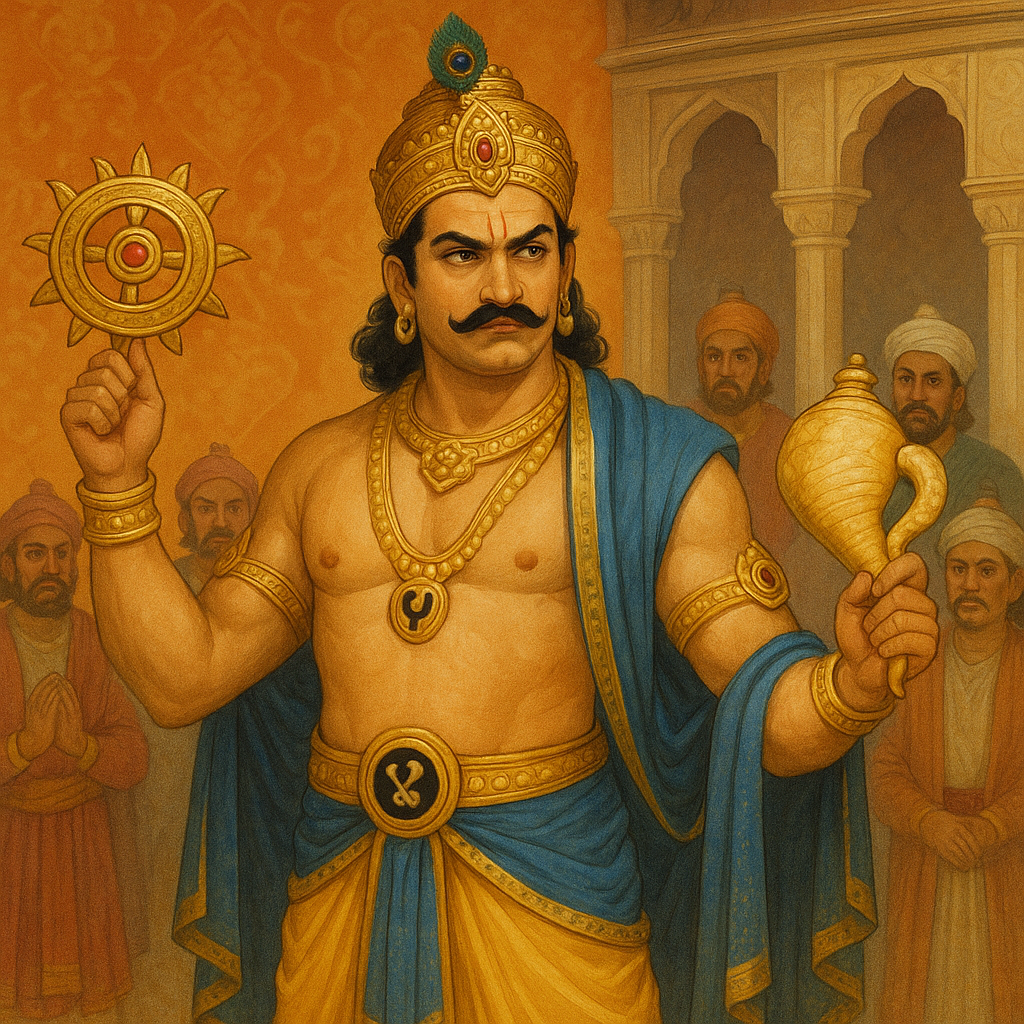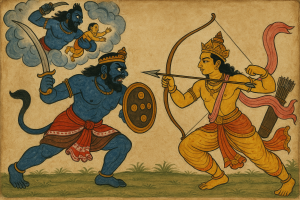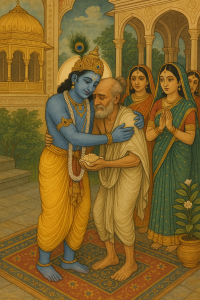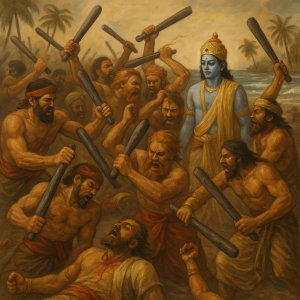The Arrogance of Pauṇḍraka
In the kingdom of Kāśī, there ruled a deluded king named Pauṇḍraka Vāsudeva. Blinded by pride and encouraged by foolish flatterers, Pauṇḍraka began to think that he himself was the Supreme Lord Viṣṇu.
He dressed like Kṛṣṇa, adorning himself with yellow garments, a fabricated śrīvatsa mark on his chest, a fake Kaustubha jewel, and even two artificial arms holding replicas of the conch and discus. His court called him “Vāsudeva,” and he began to issue commands in that name.
But imitation is never equal to reality. Kṛṣṇa is the eternal, original Vāsudeva, the Supreme Personality of Godhead. Pauṇḍraka’s blasphemy was an offense destined to bring ruin.
A Foolish Challenge to Kṛṣṇa
Puffed up by pride, Pauṇḍraka sent a messenger to Dvārakā with an outrageous message:
“I am the true Vāsudeva! Abandon Your false symbols, O Kṛṣṇa, and surrender unto Me. Return My disc, conch, and other emblems, for they belong to Me alone.”
The messenger delivered this insolence before Kṛṣṇa in the royal court of Dvārakā.
All present gasped in shock. The Yādavas were furious. But Kṛṣṇa simply smiled—a calm and mysterious smile, revealing both His divine patience and impending justice.
“So be it,” said the Lord. “I shall deliver these emblems to Pauṇḍraka Myself.”
The March to Kāśī
Kṛṣṇa mounted His chariot, driven by Dāruka, and armed with His eternal Sudarśana chakra, Pañcajanya conch, Kaumodakī mace, Sarṅga bow, and His club, He led the Yādava army toward Kāśī.
At the head of Pauṇḍraka’s forces stood the impostor himself, proudly displaying His false symbols. With him was the king of Kāśī, his ally, whose pride in Pauṇḍraka’s claims was equally great.
As Kṛṣṇa approached, thunderclouds gathered, conches blew, and celestial beings looked on, waiting for the destruction of arrogance.
The Battle and Sudarśana’s Justice
The two armies clashed. Kṛṣṇa, riding like a storm, shot divine arrows that split chariots, weapons, and pride.
Then, with supreme grace, He raised His Sudarśana chakra and said:
“You wanted My disc, O Pauṇḍraka—take it now!”
With that, Sudarśana flew like fire, slicing through the air and severing the head of Pauṇḍraka, along with his false emblems. His head, still wearing the imitation crown, fell to the ground.
The king of Kāśī too was slain, and his head rolled into the city gates. Panic swept through the kingdom.
The Avenging of Kāśī and the Fire of Sudarśana
But the wicked do not easily accept the Lord’s justice. The son of the Kāśī king, burning with vengeance, performed a demonically empowered yajña to send a mystic fire demon to consume Dvārakā.
The fire demon rose, blazing with terrifying flames, and charged toward Kṛṣṇa’s city.
But Kṛṣṇa simply called His Sudarśana chakra again.
“Sudarśana, go!”
The divine weapon flew forth, entered the fire, and consumed it completely, then burned the city of Kāśī itself—purifying it of the offense against the Lord.
Lessons to Be Learned:
- Imitation of God is the highest arrogance and the worst offense.
- Kṛṣṇa does not act immediately—He gives time to reform—but when He acts, His justice is swift and complete.
- The Lord’s weapons are personal servants, acting only under His loving command.
- Pride based on ignorance brings self-destruction, while humility leads to protection.
- Even mighty kings and cities fall when they oppose the Lord—but He protects His devotees unfailingly.
Origin of the Story: Harivaṁśa Purāṇa – Viṣṇu-parva, Chapters 88–91



